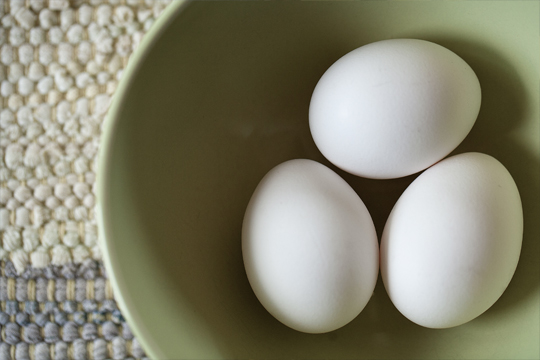
Reducing Food Waste in Foodservice
October 16, 2018 by Doreen Garelick, Dietetic Intern
Our intern Doreen attended a food waste summit for restaurants and compiled these tips to help food service operators redirect…
Nutrition 101
October 25, 2013

This little-known nutrient plays a vital role in our diets. Find out why you might need more of it.
Classified as a B vitamin, choline is an essential nutrient that ideally should be consumed -- the liver alone simply can’t synthesize enough to meet the human body’s needs. Research conducted by NHANES in 2004 revealed that less than 10% of the population had adequate intake of choline.
Choline plays a role in just about every bodily function. It has been shown to protect the liver from fat and cholesterol build-up while also assisting in proper muscle and nerve functions. It is particularly important during pregnancy as it can help reduce the rate of neural tube diseases, as well as brain and spinal defects in infants.
Meeting the proper amount of choline in one’s diet can help:
The daily requirement for choline is 425- 550 mg/day for adults. Examples of foods that are particularly high in choline include:
Foods that are rich in choline such as eggs, liver and red meats are known to raise your cholesterol level but -- when consumed in moderation -- they can be an excellent source of important nutrients. Choline can also be found in vegetarian-friendly sources such as soybeans, peanut butter, broccoli and Brussels sprouts, but the amount of choline per serving is much lower than from animal sources. For this reason, vegetarians are thought to be at greater risk of choline deficiency as they are at a higher risk of vitamin B12 deficiency, which can interfere with the synthesis of choline in the liver.
Low choline intake has also been linked to high blood pressure, high cholesterol levels, nervous system disorders and fatty liver diseases. High alcohol consumption, high sugar intake and nicotine have also been shown to contribute to choline deficiency. The upper intake level for choline is 3.5 grams/day for adults (overly high doses have been associated with vomiting, increased salivation and increased sweating).
Is there enough choline in your diet? Let us know about your favorite sources in the comments section below:

October 16, 2018 by Doreen Garelick, Dietetic Intern
Our intern Doreen attended a food waste summit for restaurants and compiled these tips to help food service operators redirect food waste from landfills.
Nutrition 101

Nutrition 101
September 26, 2018 by Doreen Garelick, Dietetic Intern
Ever notice headlines about rapid weightloss? Dietetic Intern Doreen Garelick looks deeper into a recent eye-catching headline to see if there's any truth behind it.
Connect
 Follow us on Twitter
Follow us on Twitter Friend us on Facebook
Friend us on Facebook Follow us on Pinterest
Follow us on Pinterest Follow us on Instagram
Follow us on Instagram Read our Blog
Read our Blog Watch videos on YouTube
Watch videos on YouTube Watch videos on Vimeo
Watch videos on Vimeo Connect with us on Linkedin
Connect with us on Linkedin Find us on Foursquare
Find us on Foursquare
Tweets by @SPEcertifiedBlog Search
Categories
SPE Certified Newsletter
Sign up for news on the latest SPE-certified venues, events and SPE updates.
We will never share your personal information with a third party.